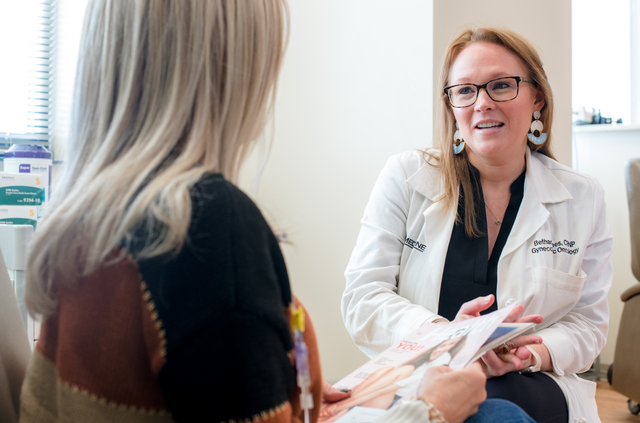Media contact: Brianna Hoge
 Over the past decade, the University of Alabama at Birmingham has become a national leader in clinical trials — studies examining the use of new treatments in people. Every drug, device and other therapy that reaches patients in the United States must go through multiple clinical trials. And more patients than ever in Alabama have access to life-changing therapies at UAB. In fact, according to the latest data available from the National Science Foundation’s HERD survey, UAB ranks fifth among public universities and 14th overall nationwide in clinical trials expenditures. In 2023, there were 1,469 active clinical trials at UAB.
Over the past decade, the University of Alabama at Birmingham has become a national leader in clinical trials — studies examining the use of new treatments in people. Every drug, device and other therapy that reaches patients in the United States must go through multiple clinical trials. And more patients than ever in Alabama have access to life-changing therapies at UAB. In fact, according to the latest data available from the National Science Foundation’s HERD survey, UAB ranks fifth among public universities and 14th overall nationwide in clinical trials expenditures. In 2023, there were 1,469 active clinical trials at UAB.
UAB’s position has a tangible effect on everyone in the state. During the COVID pandemic, Alabamians were some of the first Americans to receive access to remdesivir and other cutting-edge treatments. The same is true for revolutionary therapies for conditions that hit Alabamians particularly hard, including cancer, diabetes, obesity and sickle cell disease. Clinical trials at UAB were instrumental in the FDA approval of therapies including GLP-1 inhibitors (such as Ozempic) for obesity and diabetes, immunotherapies for cancer, and a potentially curative gene therapy for sickle cell.
“Clinical trials are really what differentiate us,” said Anupam Agarwal, M.D., dean of the UAB Marnix E. Heersink School of Medicine. “Enrolling patients in clinical trials advances the standard of care for almost every disease.” This does not mean patients in a clinical trial must miss out on the current standard of care in order to receive a cutting-edge treatment. Patients participating in a clinical trial often receive a new, experimental treatment while receiving the best available existing treatments as well.
Participating in a clinical trial can be lifesaving. “Today many patients on clinical trials are experiencing remarkable, disease-altering effects on cancers that were uniformly lethal just yesterday,” said Barry Sleckman, M.D., Ph.D., director of the O’Neal Comprehensive Cancer Center at UAB. Several patients at the O’Neal Cancer Center shared their experiences with clinical trials in this feature.
The next step, according to the university’s new Research Strategic Initiative: Growth with Purpose, is to reach even more Alabamians with the benefits of clinical trials — not just in Birmingham but in cities around the state. This is more important than ever as trials of new precision medicines bring better, more targeted treatments to patients. Because of UAB’s position in clinical trials, Alabamians will be some of the first in the country with access to these treatments — and even more Alabamians will have the chance to take part soon, says Christopher Brown, Ph.D., UAB vice president for Research.
Learn more about the impact of clinical trials and celebrate the work of all the UAB teams behind them at Clinical Trials Day from 7:30-9:30 a.m. May 20. Learn more and register here.
“A large part of our focus is on increasing access and personalizing the opportunities,” Brown said. “We want to get more people involved across the state, so we are serving our citizens better.”
UAB’s impact on Alabama through clinical trials is already significant. According to a report from UAB affiliate Southern Research, Alabama ranks 16th among U.S. states in clinical trials per capita, with 67 percent of the state’s clinical trials conducted in Birmingham. One of the five goals of the UAB Research Strategic Initiative: Growth with Purpose is to expand clinical research across Alabama, including in cancer, neurology and cardiology.
Patients benefit from clinical trials because they can often receive comprehensive health care at low cost. Providers receive funding via patient recruitment fees and site operations costs, researchers advance scientific knowledge and health care delivery, and state and regional governments see increased economic growth in a high-skill industry with laddered career opportunities.
“The purposeful focus on clinical trials — among other key opportunities — in UAB’s Research Strategic Initiative, will result in lifesaving, life-changing advancements,” said UAB President Ray L. Watts. “We could not accomplish this without the talented, dedicated UAB faculty and staff, and our patients who participate in clinical trials.”
 Participating in a clinical trial can be lifesaving, and now, more patients than ever have access to life-changing therapies at UAB.In addition to the impact on health, clinical trials generate a significant economic benefit within Alabama as well, according to the Southern Research report. They create thousands of jobs in the state and hundreds of millions of dollars in economic impact, but these effects are centered in the Greater Birmingham area.
Participating in a clinical trial can be lifesaving, and now, more patients than ever have access to life-changing therapies at UAB.In addition to the impact on health, clinical trials generate a significant economic benefit within Alabama as well, according to the Southern Research report. They create thousands of jobs in the state and hundreds of millions of dollars in economic impact, but these effects are centered in the Greater Birmingham area.
Increasing the number of early stage Phase 1 and Phase 2 trials outside of Birmingham by 50 percent would create 635 new jobs and add more than $58 million to the state’s GDP, including nearly $5 million in recruitment fees to providers and financially strapped rural hospitals, Southern Research estimates. Reaching that goal will require making connections between rural providers and research sponsors, a standardized database for researchers to reduce patient recruitment costs, and access to community-based clinical research for patients.
A similar effort in Missouri and Illinois has shown the power of this approach, Southern Research points out. The Heartland Cancer Research network serves 114 counties across the two states that encompass underrepresented populations. The network has made progress toward its mission of enhancing clinical trials by increasing community access and removing financial barriers. It has increased patient diversity in trials as well, drawing 36 percent of participants from rural areas; 27 percent have incomes below $25,000 and 17 percent either are uninsured or have Medicaid.
To meet the goals of the Research Strategic Initiative: Growth with Purpose, UAB has created a new leadership position in the Office of Research, an assistant vice president for Clinical Trials Operations. That position is expected to be filled soon. The plan also includes a focus on standardizing the university’s digital clinical trial management system and streamlining the contracting process. In order to keep the new targets top of mind for everyone on the team, a clinical trials dashboard has been created as well.
“Time is the coin of the realm when it comes to clinical trials,” Brown said. “That is the measure we use to gauge our efficiency in research administration — are we making things faster and easier for faculty and staff? Because that will quickly have an effect on people across the state.”